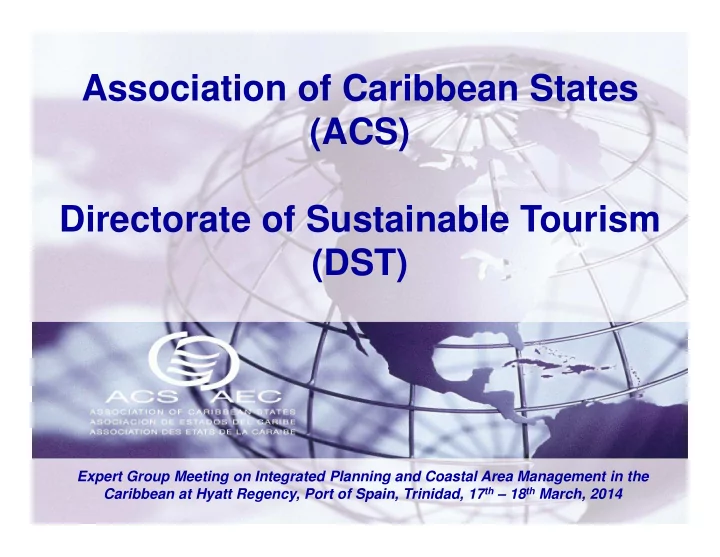

Association of Caribbean States (ACS) Directorate of Sustainable Tourism (DST) Expert Group Meeting on Integrated Planning and Coastal Area Management in the Caribbean at Hyatt Regency, Port of Spain, Trinidad, 17 th – 18 th March, 2014
The Association of Caribbean States Established in 1994 to promote consultation, cooperation and concerted action in the Greater Caribbean (25 Member States and 3 Associate Members).
Focal Areas / Directorates of the ACS
Programmatic Areas Sustainable Tourism Zone of the Greater Caribbean (STZC) 1. Promotion of Languages and Cultures of the Greater 2. Caribbean (CPLC) Promotion of Multi-Destination Tourism (MDT) 3. Establishment of the Regional Tourist Safety and Security 4. Network in the Greater Caribbean (RTSSN)
What is Sustainable Tourism? � Sustainable tourism is tourism attempting to make a low impact on the environment and local culture, while helping to generate future employment for local people. � The aim of sustainable tourism is to ensure that development brings a positive experience for local people, tourism companies and the tourists themselves.
SUSTAINABLE TOURISM ZONE OF THE GREATER CARIBBEAN (STZC) � The STZC has been identified “as a geographically determined cultural, socio-economic and biologically rich and diverse unit, in which tourism development will depend on the sustainability and the principles of integration, co- operation and consensus, aimed at facilitating the integrated development of the Greater Caribbean”. � The STZC entered into force on November 6th, 2013. � The Greater Caribbean is now designated as the first Sustainable Tourism Zone in the world .
SUSTAINABLE TOURISM ZONE OF THE GREATER CARIBBEAN (STZC) The establishment of the STZC will: � 1. Leverage marketing and promotion by raising awareness in the international travel market of the commitment of the countries of the Greater Caribbean in adhering to the principles of sustainable and responsible Tourism development.
SUSTAINABLE TOURISM ZONE OF THE GREATER CARIBBEAN (STZC) 2. Enhance resource mobilisation efforts for the development and implementation of sustainable tourism projects and strategies; 3. Contribute to more efficient management of natural resources and the environment and assist with mitigation of the effects of climate change to the Greater Caribbean region.
SUSTAINABLE TOURISM ZONE OF THE GREATER CARIBBEAN (STZC) Progress to date: � Development of the Sustainable Tourism Indicators – Criteria for destination evaluation which consists of a range of basic indicators, specific measurements, regional standards and optional benchmarks. Developed in collaboration with Regional Sustainability experts and the UNWTO.
SUSTAINABLE TOURISM ZONE OF THE GREATER CARIBBEAN (STZC) � Development of Tools and Manuals : � Guidelines for the Selection of Applicant Destinations � Destination Profile Form Template � Destination Evaluation Form � Indicative Guide to Destination Evaluation Form
SUSTAINABLE TOURISM ZONE OF THE GREATER CARIBBEAN (STZC) � Destination Evaluations - Twelve Destinations in the Region have been evaluated to date. ACS Member States and Associate Members Destinations P Dominica City of Roseau h Dominican Republic Bayahibe a s Jamaica Ocho Rios Resort Area e I Port Antonio ( For Phase II ) P Mexico Cozumel i l o Panama Portobelo t France (Guadeloupe) Verte Vall é e (Guadeloupe) St Fran ç ois – Pointe des Châteaux P (French Guyana) Yalimapo h G a r (Martinique) Caravelle Peninsula s o e u (Martinique) Sainte-Anne Municipality p I 1 Saint Vincent and the Grenadines Richmond / Lashum Site I Tobago Cays Trinidad and Tobago Buccoo Reef - Tobago
REGIONAL COOPERATION MECHANISM (RCM) OF THE STZC The Regional Cooperation Mechanism component of the STZC is being executed in collaboration with the Regional Cooperation Council of Martinique and includes: � Study on Sustainable Tourism in the Greater Caribbean; � Formalisation of the STZC Steering committee for consultation and integrated planning among STZC stakeholders; � Development of the STZC website to promote the initiative and destination management tools; � Expansion of the Sustainability Indicators , to have at least one destination in each ACS Member and Associate Member State STZC designated.
TRAINING FOR CAREERS IN SUSTAINABLE TOURISM PROJECT The DST in collaboration with the French Development � Agency (AFD), launched the consultancy for the Training for Careers in Sustainable Tourism Project. (January 10 th , 2014) This project seeks to enhance the productivity and � competitiveness of the Regional Tourism Industry through knowledge enhancement in the area of human resource development in relation to Technical and Vocational Education and Training (TVET) in Tourism.
TRAINING FOR CAREERS IN SUSTAINABLE TOURISM PROJECT The project will entail the following: � Identify the specific needs and areas for Training and Human Resource Development in the Tourism Sector in the Greater Caribbean. � Determine existing gaps and challenges in relation to Training and Capacity-Building. � Provide recommendations to address existing needs as well as new priorities identified. � Develop a Directory of Tourism and Hospitality Training Institutions and courses offered in the Greater Caribbean. � Develop a Framework for the implementation of a Comprehensive Training and Capacity Program.
Case Studies of Sustainable Tourism in the Greater Caribbean Jamaica Environmental and social stewardship: � Royal Palm Preserve near Negril is designed to protect and conserve the protected area of the Negril Great Morass and its wetland flora and fauna. � It aims to raise the level of awareness, knowledge and understanding about the wetlands and to provide opportunities to citizens of neighbouring communities. � These opportunities enable income generation through direct employment, training and the facilitation of sustainable livelihood projects in the community.
Dominican Republic Project: Dominican Republic Sustainable Tourism Alliance Supporting and managing the growth and development of sustainable tourism in the Dominican Republic. Activities: � Developing DMOs � Building capacity � Identifying more tourism offerings � Establishing strategic alliances
THANK YOU FOR YOUR ATTENTION
Recommend
More recommend